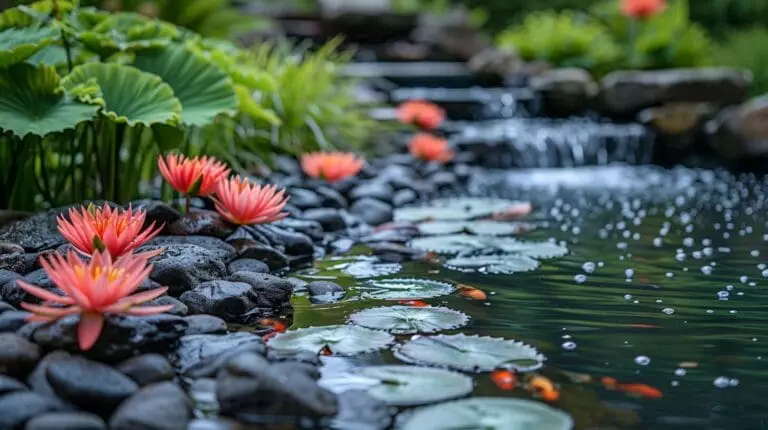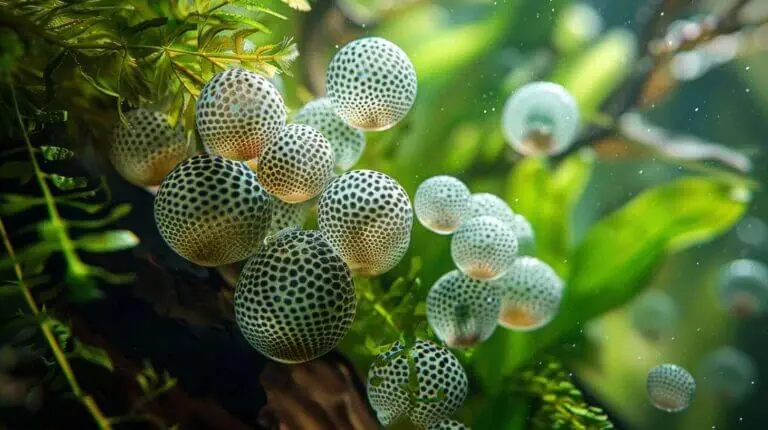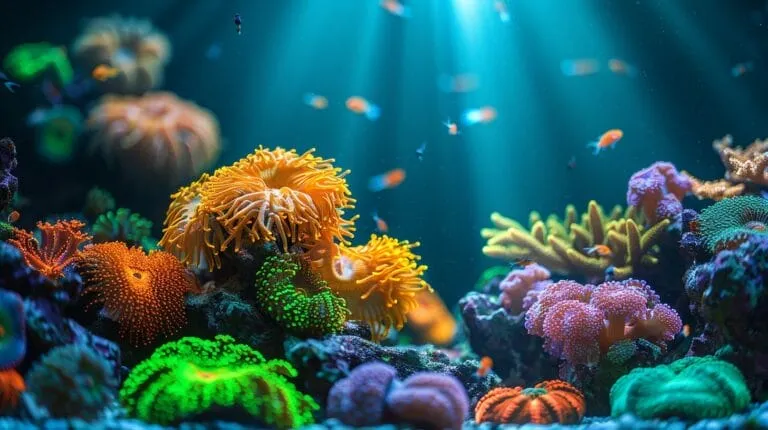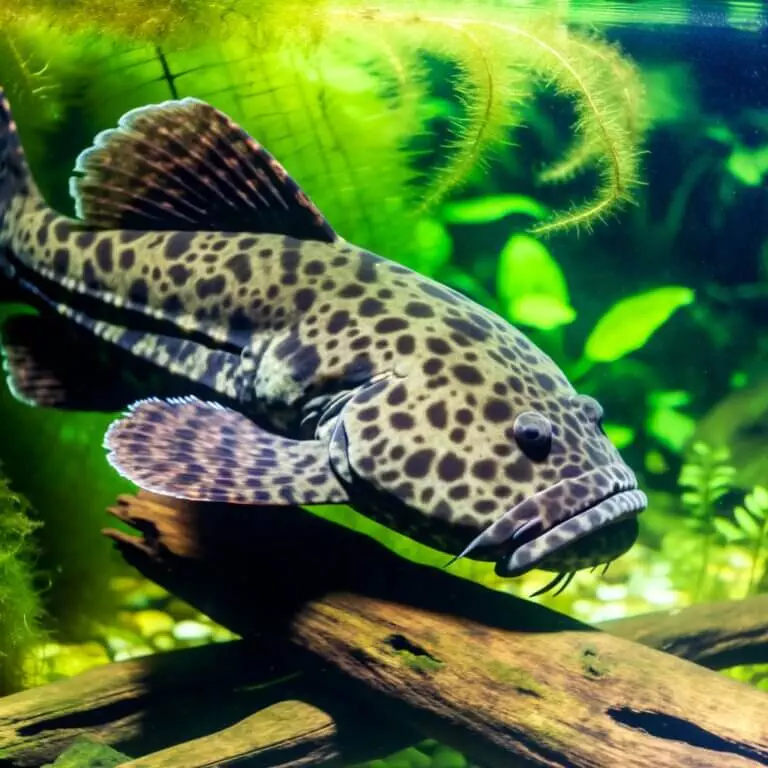If you’re considering using lemon juice to adjust your fish tank’s pH, you should know it’s not as straightforward as it seems. While lemon juice is acidic and can lower pH temporarily, it often leads to sudden changes that can stress your aquatic life. Before you decide, it’s important to understand the risks and explore safer methods that maintain a stable environment for your fish.
Understanding the Tank Environment Before You Use Lemon

Before adding lemon juice to your fish tank, you need to understand how pH levels affect your fish’s health. Keeping water conditions stable is essential for a balanced aquarium environment. You should also consider whether lemon juice can effectively and safely change your tank’s pH.
How pH Affects Fish in an Aquarium
Because pH levels directly influence the health and behavior of your fish, you need to understand how the tank’s pH affects them before adding substances like lemon juice. (Aquarium Industries)
Fish rely on stable water parameters to thrive, and sudden shifts in water chemistry can stress or harm them. In freshwater tanks, maintaining proper pH stability ensures fish metabolism, respiration, and immune function stay balanced. (Envii, FDACS)
When you adjust water conditions, you alter this delicate equilibrium, so monitoring pH helps you serve your aquatic pets better.
Why Stable Water Conditions Matter in Your Tank
Maintaining stable water conditions in your tank helps keep your fish healthy and reduces stress caused by sudden changes. When you focus on pH stability, you support a balanced environment where fish thrive without the shock of fluctuating acidity.
Consistent water quality is essential—not just for your fish but for the beneficial bacteria that break down waste. During fish tank maintenance, be mindful of how water additives, including acidic ones like lemon juice, might affect this balance.
Understanding your tank’s environment before adding anything ensures you don’t disrupt the delicate ecosystem. By keeping conditions steady, you create a safe space for your aquatic friends to flourish, showing care that truly serves their wellbeing and maintains a thriving aquarium.
Can Lemon Juice Alter the Aquarium’s pH Effectively?
How effectively can lemon juice change your aquarium’s pH? Before adding lemon juice, you need to understand your tank’s current water chemistry. Lemon juice is acidic, so it can cause acidification by lowering the pH of aquarium water. (Aquaforest, Poolsmith)
While this might seem helpful to adjust pH levels temporarily, lemon juice doesn’t provide long-term pH stability. Its effects are often unpredictable and can fluctuate quickly, which stresses fish and disrupts the ecosystem.
To serve your aquatic life well, test the water’s pH regularly and consider safer, controlled methods to manage pH stability. Using lemon juice without fully understanding your tank environment risks harming your fish and plants by causing sudden pH swings instead of balanced water chemistry.
Is It a Good Idea to Add Lemon in a Fish Tank?
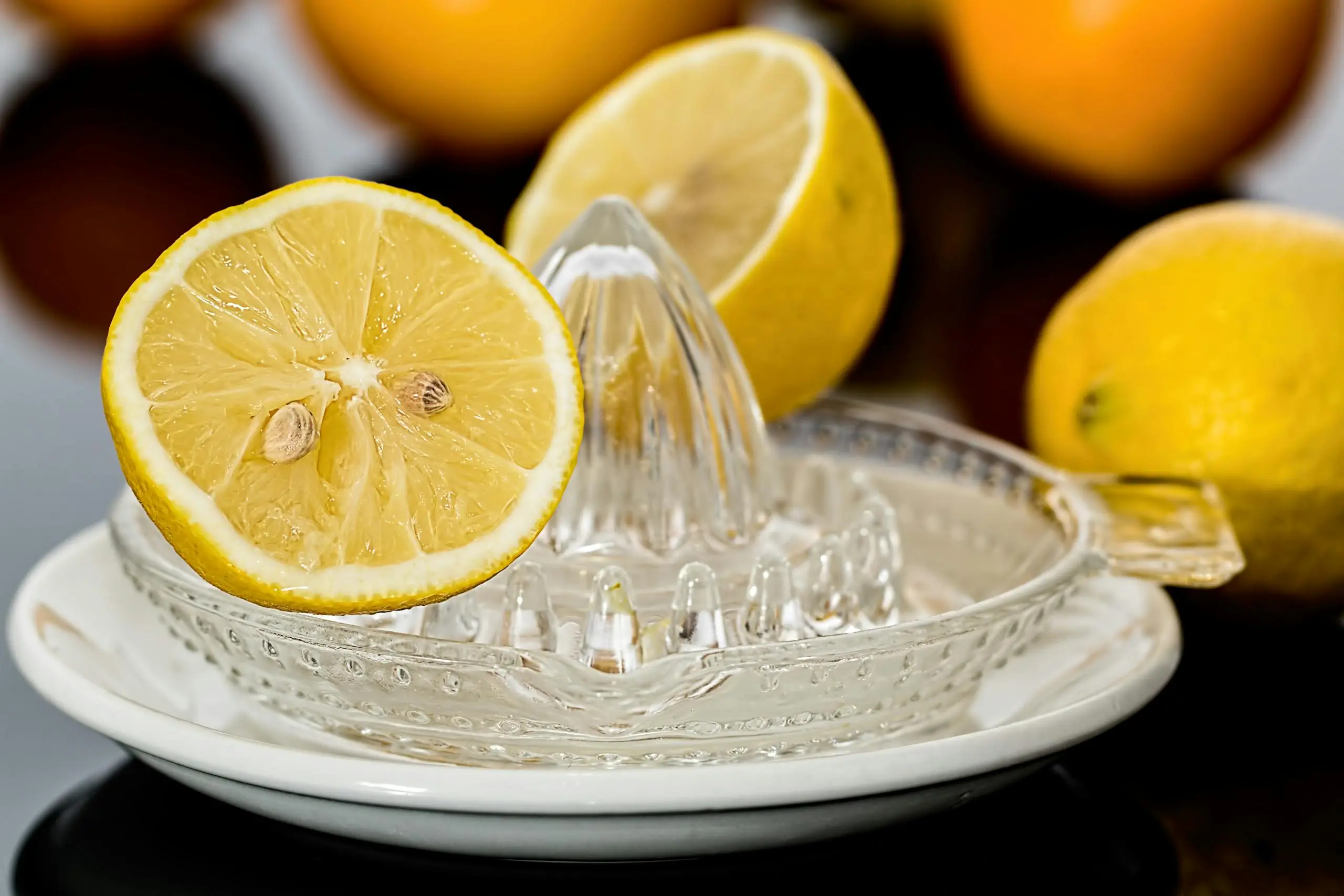
You might wonder if adding lemon juice to your fish tank could be helpful or harmful. While some believe it offers benefits like pH adjustment, others warn of risks and misunderstandings.
Let’s look at expert opinions to see if lemon is really necessary for your aquarium.
Potential Benefits of Lemon Juice in Aquarium Water
Although lemon juice is praised for its natural cleaning properties, adding it to your fish tank isn’t typically recommended. However, you might find some potential benefits when used carefully.
Lemon juice can help with pH stabilization in aquarium water by slightly acidifying it, which may benefit certain species or planted tanks that thrive in mildly acidic conditions. When you adjust water chemistry with lemon juice, you’re fundamentally mimicking natural environments where organic acids occur.
This can promote healthier plant growth and support beneficial microorganisms. If you’re serving others by maintaining a balanced ecosystem, understanding how lemon juice influences water chemistry can be helpful.
Just remember, any adjustments should be made cautiously to avoid sudden changes that could stress your aquatic life.
Risks and Misconceptions About Using Lemon in a Tank
While lemon juice can offer some minor benefits for certain aquarium setups, it’s important to be aware of the risks and common misconceptions surrounding its use. Adding lemon juice to your tank can disrupt water chemistry, causing sudden pH fluctuations rather than promoting pH stability. These rapid changes stress fish and can lead to health problems.
Many believe lemon juice naturally balances pH long-term, but in reality, it’s an unstable method that risks harming your aquatic environment. You should avoid relying on lemon juice as a pH regulator because aquarium risks include damaging beneficial bacteria and altering essential mineral levels.
Serving your fish well means understanding these misconceptions and choosing safer, proven methods to maintain a healthy, stable aquarium ecosystem.
Expert Opinions on Whether You Need to Use Lemon
Even though some hobbyists swear by lemon juice for their tanks, most experts advise against using it. When you care for a fish tank, maintaining pH stability is vital, and lemon juice can cause sudden shifts that stress your aquatic friends.
Expert advice typically favors controlled water adjustment methods, like commercial buffers or tested additives, over natural acids like lemon juice. If you want to serve your fish well, avoid quick fixes that disrupt their environment.
Instead, test your water regularly and make gradual changes. Using lemon juice might seem like a natural solution, but it often leads to unpredictable pH swings that can harm your tank’s delicate balance. Trust expert guidance to keep your fish tank safe and healthy without risking sudden pH changes.
How to Safely Add Lemon Juice to Your Aquarium Tank

To safely add lemon juice to your aquarium, start by measuring small amounts to avoid sudden pH changes. You’ll want to monitor the water’s pH closely and adjust the dosage as needed to keep it stable.
After adding lemon juice, watch for any water changes and fish reactions to guarantee a healthy environment.
Step-by-Step Guide to Using Lemon Juice in Your Fish Tank
Although lemon juice can offer benefits like adjusting pH or controlling algae, you need to add it carefully to avoid harming your fish. Start by testing your aquarium water’s current pH. Dilute lemon juice with water to prevent sudden pH shifts. Add small amounts slowly, observing changes in pH and fish behavior. Maintain stable pH through regular monitoring as part of your fish tank maintenance routine.
| Step | Action |
|---|---|
| 1. Test pH | Measure aquarium water pH |
| 2. Dilute juice | Mix lemon juice with water |
| 3. Add gradually | Introduce lemon juice slowly |
| 4. Monitor | Check pH and fish response |
| 5. Maintain | Repeat as needed for stable pH |
Dosage Considerations to Maintain a Stable pH
When you add lemon juice to your aquarium, you’ll need to carefully control the dosage to keep the pH stable and protect your fish. Start by adding small, measured amounts—usually a few drops per gallon—then observe how your water chemistry responds.
Too much lemon juice can drastically lower pH, stressing your aquatic friends. Consistent, moderate dosage helps maintain pH stability without sudden shifts. Remember, lemon juice is acidic, so balance is key in your aquarium maintenance routine.
Always mix the lemon juice with tank water before adding it to avoid localized acidity spikes. By taking these careful steps, you serve your fish well, supporting a healthy, stable environment that benefits the entire aquarium ecosystem.
Monitoring Water Changes After Adding Lemon Juice
Since lemon juice can quickly alter your aquarium’s pH, you’ll need to monitor water changes closely after adding it. Start by testing the water’s pH before and after each water change to ensure stability. Keep detailed records of your water testing results to track how lemon juice affects the tank over time. When performing a water change, replace only a small portion of the water to avoid sudden pH swings.
Consistent monitoring helps you respond promptly if pH drifts outside the safe range for your fish. By carefully balancing the amount of lemon juice and water changes, you’ll maintain a stable environment that supports your aquatic life.
This diligent approach shows your commitment to serving your fish’s health and well-being.
Alternatives for Managing Aquarium pH Besides Lemon Juice

If you’re looking for alternatives to lemon juice for managing your aquarium’s pH, peat is a natural option that helps stabilize water chemistry. You can also explore other natural methods to adjust pH without causing stress to your fish.
Comparing these approaches will help you decide which method suits your tank’s needs best.
Using Peat to Stabilize pH in a Fish Tank
Although lemon juice is sometimes considered for adjusting aquarium pH, using peat offers a natural and effective alternative that can help you maintain stable water conditions. Peat water promotes pH stabilization by slowly releasing tannins and humic substances, which gently lower pH and soften fresh water. This method supports balanced water chemistry and provides a natural water treatment that benefits sensitive fish species. When you use peat, you’re serving your aquatic community with a steady environment that encourages health and longevity.
| Feature | Benefit | Application Tip |
|---|---|---|
| Peat Water | Gradual pH lowering | Add peat bags to filter or tank |
| pH Stabilization | Prevents pH swings | Monitor pH regularly |
| Fresh Water | Softens water | Use with freshwater species |
| Water Treatment | Natural tannins release | Replace peat every 3 months |
Other Natural Methods to Adjust Aquarium Water Chemistry
Peat offers a reliable way to gently balance your aquarium’s pH, but you might want to explore other natural options to fine-tune water chemistry. Adding driftwood or Indian almond leaves can release tannins, which act as natural buffering agents to lower pH gradually while supporting pH stability.
Crushed coral or limestone raises alkalinity, helping buffer acids and maintain a stable pH environment. Using these natural methods not only adjusts water chemistry but also creates a healthier, more balanced habitat for your fish.
Remember to monitor changes carefully, as abrupt shifts can stress aquatic life.
Comparing Lemon with Other pH Management Ideas for Tanks
When managing your aquarium’s pH, you might consider options beyond lemon juice to guarantee a stable, healthy environment. While lemon juice offers a natural way to lower pH, alternatives like peat moss, crushed coral, or commercial buffers can provide more controlled tank stabilization. Each method impacts water chemistry differently, so understanding these effects helps you serve your aquatic life better through thoughtful aquarium care.
| Method | Effect on pH |
|---|---|
| Lemon Juice | Lowers pH naturally |
| Peat Moss | Gradually lowers pH |
| Crushed Coral | Raises pH gently |
| Commercial Buffers | Precisely adjusts pH |
Research and Case Studies on Lemon in a Fish Tank

You’ve probably wondered how lemon juice really affects your aquarium water. Recent studies show it can lower pH temporarily but may disrupt the tank’s balance if overused.
As research continues, new methods for safer pH control are emerging that you’ll want to keep an eye on.
Recent Studies About Lemon Juice’s Effect on Aquarium Water
Although lemon juice is sometimes suggested as a natural way to adjust aquarium pH, recent studies show it can cause harmful fluctuations in water chemistry that stress fish and disrupt beneficial bacteria.
When you add lemon juice, its acidic solutions quickly lower pH but fail to maintain pH stability over time. This instability complicates fish tank maintenance, forcing you to constantly monitor and adjust water parameters. Researchers emphasize that sudden pH swings harm aquatic life and weaken the tank’s biological filtration.
Instead of relying on lemon juice, consider safer, tested methods to balance pH. Your goal is to create a stable environment that supports fish health and beneficial bacteria, ensuring long-term success in aquarium care and fostering a thriving underwater community.
Future Trends and Ongoing Developments in Aquarium pH Control
As researchers continue exploring effective ways to manage aquarium pH, new studies on lemon juice’s impact offer valuable insights for hobbyists like you. Future trends in pH control focus on natural stabilization methods, reducing reliance on harsh chemical additives, and improving water chemistry balance. Ongoing developments aim to make maintaining a stable environment easier and safer for fish and plants.
| Aspect | Future Focus |
|---|---|
| pH Control | Natural alternatives like lemon juice |
| Water Chemistry | Enhanced monitoring tools |
| Stabilization | Sustainable, gentle methods |
| Chemical Additives | Reduced use, safer options |
Conclusion
While lemon juice can temporarily lower your fish tank’s pH, it’s not a reliable or safe method for long-term stability. You risk causing harmful fluctuations that stress your aquatic life. Instead, consider safer options like peat moss or commercial pH buffers for gradual, stable adjustments. Always test your water regularly and proceed cautiously. If you’re unsure, consult an aquarium expert to keep your tank healthy and your fish happy.
FAQs
1. Can Lemon Juice Harm Beneficial Bacteria in the Aquarium Filter?
Yes, lemon juice can harm beneficial bacteria in your aquarium filter if used excessively. You’ll want to avoid sudden pH changes to protect these helpful microbes that keep your tank’s ecosystem balanced and healthy for your fish.
2. How Does Lemon Juice Affect Different Fish Species’ Health?
You’ll want to be cautious, as lemon juice can stress sensitive fish by lowering pH too quickly. Hardy species might tolerate it briefly, but it’s best to prioritize their well-being and avoid sudden changes in water chemistry.
3. What Are Signs of Ph Imbalance After Adding Lemon Juice?
You’ll notice fish gasping at the surface, lethargy, or erratic swimming if pH’s off. Plants may wilt, and water could turn cloudy. Act quickly to restore balance and protect your aquatic friends.
4. Can Lemon Juice Discolor Aquarium Plants or Decorations?
Yes, lemon juice can discolor aquarium plants and decorations if used excessively. You’ll want to add it sparingly and monitor your tank closely to keep everything vibrant and healthy for your aquatic friends.
5. How Often Should Lemon Juice Be Added to Maintain Ph Stability?
You shouldn’t add lemon juice regularly; instead, test your tank’s pH first. Only add small amounts when necessary to gently adjust levels, ensuring you don’t stress your fish or disrupt the aquarium’s balance.


